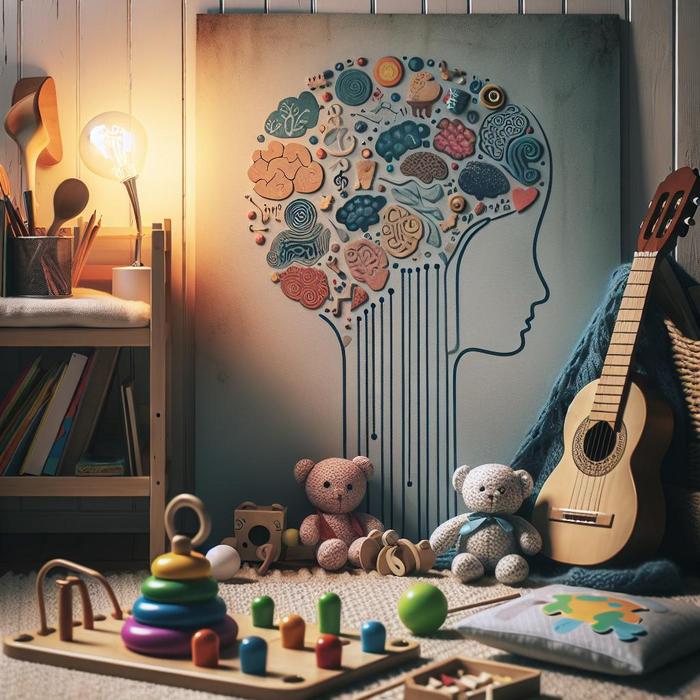Understanding the Importance of Sensory Play in Our Kids’ Life
Sensory play is a rarely overlooked aspect of a child’s learning and development process. The countless experiences that come with it play a pivotal role in enhancing their neurological connections. It goes beyond just ‘fun and play’; it aids in the cognitive development of our little ones. Cognitive development pertains to how a child perceives, thinks, and gains understanding through their interactions, sensory experiences and information gained from the surrounding world. Research has shown that sensory play is one of the most effective ways to boost this cognitive development.
Why Sensory and Brain-Boosting Play Matters
Sensory play caters to our children’s curiosity and their intrinsic need to explore and interrogate the environment around them. It provides opportunities for children to actively use their senses as they play, create, investigate and explore, leading to numerous benefits, such as:
- Developing and enhancing memory
- Building nerve connections in the brain’s pathways
- Encouraging the development of motor skills
- Supporting language development
- Enhancing ‘learning through play’ experiences
- Improving social interaction
- Developing and improving problem-solving skills.
By introducing sensory play ideas into our children’s routine, we are setting the tone for positive, brain-boosting experiences that can benefit them in numerous ways. Studies have proven the importance of sensory play in cognitive development, even leading to better performance in school tasks.
Sensory Play Ideas to Boost Cognitive Development
Sensory play ideas are not just about messy water or paint play. Stimulating activities can be structured in countless ways, suitable for kids of all ages:
- Dough Playtime: Using playdough or any other moldable substance, kids can explore through touch, develop fine motor skills, and unleash their creativity.
- Nature Hunt: Playdates with nature are one of the most effective sensory play activities. Exploring textures, sounds, and scents outdoors stimulates all senses and promotes awareness of the environment.
- Food for Thought: Introducing kids to food textures and tastes is a sensory play in itself. It can also promote healthier eating habits.
- Play with Art & Craft: Drawing, painting, and cutting can enhance fine motor skills, color recognition, and creativity.
- Sound Exploration: Create a simple music station with homemade instruments to explore different sounds and rhythms.
These are just a few examples of sensory play ideas. The possibilities are endless, and the important thing is to offer your child the opportunity to explore, play and learn in a safe environment. For more brain-boosting play ideas, check out this resource.
Integrating Sensory Play Into Day-to-Day Activities
Besides independent play, daily activities like feeding, breastfeeding, bathing or even a simple stroll in the park can become sensory stimulating activities. The key is to make them interactive – talk about the textures, colors or sounds you and your baby encounter in these everyday scenarios. This involvement is not only enjoyable for them, but it also contributes to their cognitive skill development.
Using Sensory Play Toys for Your Child’s Development
Incorporating sensory play toys is an excellent way to boost your child’s cognitive development. Whatever your child’s age, there are numerous sensory play toys available on the market that can stimulate their senses, encourage creativity, and enhance their motor skills. They include:
- Sensory bins: Filled with various materials such as sand, rice, water beads, these bins encourage kids to scoop, dig, and pour, thereby enhancing their fine motor skills.
- Touch-and-feel books: These books with textured pages engage your child’s sense of touch while supporting language development.
- Sound puzzles: By matching the right pieces, kids can trigger certain sounds, thereby learning cause-effect relationships while enjoying enhanced auditory sensory play.
- Sensory mats : With different textures, colors, and often sounds, these mats invite exploration and promote visual, tactile, and auditory stimulation.
- Squishy toys : These can be squeezed, smashed, stretched, and poked, providing a calming sensory experience while strengthening hand muscles.
To further explore sensory play experiences, you can visit The Sensory Zone which offers myriad sensory play programs.
The Role of Sensory Play in Social-Emotional Development
Beyond cognitive benefits, sensory play also significantly benefits a child’s social-emotional development. According to Brightwheel, through sensory play, children learn to express their emotions, understand others’ feelings, and develop a sense of self. Engagement in sensory play stimulates children’s senses, helping them process and respond to complex social stimuli, fostering empathy and understanding.
Most importantly, through sensory play, children can experience a sense of accomplishment, build self-confidence, and develop resilience and adaptability – key attributes for social interactions and emotional well-being.
Concluding Thoughts on the Importance of Sensory Play
There’s no denying the significant role sensory play holds in the overall development of a child. Whether it’s cognitive or social-emotional development, sensory play forms a critical part of children’s learning journey. By providing a variety of sensory experiences, we are not only broadening our children’s understanding of the world but also empowering them to become independent, creative, critical thinkers.
As parents and educators, it’s our responsibility to facilitate sensory-rich experiences, integrating them into everyday activities, and providing supportive tools and resources to aid this development. As children explore and engage with the sensory-rich world, they are building the foundations for a lifetime of learning.
Remember, each child is unique, and while some may gravitate more towards certain sensory activities, the key is to offer a range of experiences to stimulate all senses. Check out the extensive resource on sensory play at Only About Children.
For more comprehensive information on how sensory play impacts childhood development, this Forbes article provides valuable insights.

